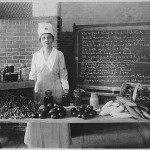 For most of his tenure, Dr. Harry Hummer ran the Canton Asylum for Insane Indians as the only medical person on staff. He resisted trained nurses (probably because they could challenge his own expertise) and immediately undermined and harassed the nurses forced on him by the Indian Service. Grace Fillius reported to the asylum in September, 1928, and her strong personality immediately clashed with Hummer’s.
For most of his tenure, Dr. Harry Hummer ran the Canton Asylum for Insane Indians as the only medical person on staff. He resisted trained nurses (probably because they could challenge his own expertise) and immediately undermined and harassed the nurses forced on him by the Indian Service. Grace Fillius reported to the asylum in September, 1928, and her strong personality immediately clashed with Hummer’s.Fillius had worked as a nurse with the Army during the Great War, and suffered a breakdown in 1918 which apparently required a short stay at St. Elizabeths. When Hummer began his work against her, he brought up this breakdown as a weakness inherent in her character. Though this “cause for concern” was probably produced out of spite, it also fit in with Hummer’s philosophy that a person could never truly be cured of mental illness (see last post).
______________________________________________________________________________________



